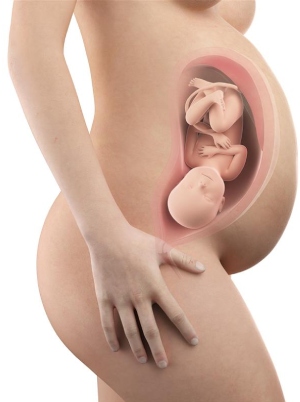You’ve reached Week 40—what an incredible journey you’ve taken! For months, you’ve cared for your growing baby, and now you’re in the final stretch. While your due date is here, it’s important to remember that only about one in twenty babies are born right on that day. It’s completely normal for labor to start a little before or after your expected date—your baby is simply making sure everything is perfectly ready for their grand entrance.
This week, you might feel a swirl of emotions. Some moms feel excitement, others grow impatient, and many experience a mix of both. If you’re feeling tired or anxious, know that it’s understandable. Most women go into labor between 38 and 42 weeks, so you are not alone if your baby seems to be taking their time. Every baby’s arrival is unique, and a little extra time inside is usually safe and healthy.

Your belly is likely at its biggest now, and moving around can feel challenging. Common signs that labor might be near include feeling lighter if your baby drops lower, more frequent Braxton Hicks contractions, or even an energy burst known as “nesting.” Still, every mom’s experience looks a bit different, so don’t worry if these signs haven’t appeared yet.
In Week 40, many women have a prenatal check-up. Your doctor or midwife might talk about options if labor hasn’t started spontaneously soon, such as “stripping membranes” or planning for an induction after 41 weeks. Remember, these decisions always consider what’s safest for you and your baby.
- Have your hospital bag ready with essentials for you and baby.
- Keep eating well and drinking water, as your body needs energy for labor.
- Rest whenever you can. Sleep may be tricky, but even short naps help.
- Stay connected with your care team—always ask questions or share concerns.
It may require patience, but your baby will be here soon. You are doing beautifully, and every moment brings you closer to holding your precious little one in your arms. Trust your body, trust the process, and lean on those around you for support as you await this exciting arrival!
Your Baby’s Development This Week
Congratulations, you’ve reached week 40! This is a huge milestone, and even though the wait may feel long, your baby is ready for their big debut any day now. Let’s explore what’s happening with your little one at this amazing stage.
By now, your baby is about the size of a small pumpkin—typically weighing between 7 and 8 pounds and measuring around 20 inches long. Of course, every baby is unique, so yours may be a little smaller or bigger, which is perfectly normal.
Inside your womb, your baby’s body has been getting everything set for life outside. Their lungs are strong and prepared to take those very first breaths, while the digestive system is ready for its first meal. The liver and kidneys have also matured enough to process food and waste once your baby’s born.
- Brain Power Boost: Even though your baby’s brain is already very active, growth continues rapidly after birth. Right now, those tiny nerve cells are connecting at lightning speed, laying the groundwork for learning, touch, taste, and even remembering your voice.
- Practicing Skills: Your baby isn’t just waiting around! They’re blinking, turning their head, squeezing their hands into tiny fists, and responding to sounds around them—especially the familiar voices of mom and dad. Some babies even get the hiccups as they practice breathing movements.
- Soft Spots for Safety: The baby’s skull isn’t fully fused yet; soft spaces called fontanels make the head flexible so it can fit through the birth canal. These spots will close as your baby grows during the first couple of years.
- Cozy and Cuddled: At week 40, your baby is curled up tightly in your uterus because space is limited! If their head has moved (“dropped”) into your pelvis, it means your baby is getting settled for birth.
Some babies are born with a full head of hair, while others have just a few soft wisps. Tiny fingernails may even extend past the fingertips, and you might notice delicate eyebrows and eyelashes when you meet your little one for the first time.
Your baby’s skin is smoother now because most of that protective coating, called vernix, has started to disappear. You might still see some of it, especially if your baby arrives a bit earlier or later than expected.
It’s normal for babies at 40 weeks to be alert and responsive, moving less as things get snug, but each squirm or twist means your little one is preparing and saving energy for the journey ahead.
While every pregnancy is different, most babies do just fine if they decide to take a little extra time before birth. Try to rest, stay hydrated, and talk or read to your baby—the sound of your voice is very comforting to them, even now.
Remember, whether your baby arrives today, next week, or needs a little nudge from your care team, you’ve done an incredible job nurturing them this far. The finish line (and that first cuddle) is so close!
Changes in the Mother’s Body
Reaching week 40 of pregnancy is truly an accomplishment! At this stage, your body has been working overtime to nurture and protect your baby, and the physical and emotional experiences you’re having are all part of your body’s preparation for birth. Here’s what you can expect as you reach those final days before meeting your little one.
Physical Sensations and Discomforts
By now, you’re likely noticing a whole mix of sensations, some new and some more intense than before. Many women feel a persistent heaviness or “pressure” low in their pelvis as the baby settles deeper in preparation for labor. Walking might feel different—many moms describe a side-to-side “waddle” because of the baby’s position and relaxed pelvic joints.
- Back, Hip, and Pelvic Aches: With baby so low and your muscles stretched to their limit, aches in your lower back, hips, and inner thighs are completely normal.
- Shooting or Tingling Sensations: Some women experience zings of pain or tingling in their legs or pelvis. This is often from nerves being gently pressed by baby’s head. It can feel surprising but usually isn’t a danger—just another sign things are progressing.
- Swelling: You might notice some additional swelling in your feet, ankles, and hands, especially after a long day. While mild swelling is expected, be sure to call your provider if you notice sudden or severe swelling, just to be safe.
- Digestive Changes: Heartburn and indigestion may continue, and you may find yourself running to the bathroom more often thanks to the baby pressing on your bladder.
Getting Ready for Labor
Your body gives lots of clues that it’s getting ready for delivery, even before contractions begin. Some moms notice an increase in vaginal discharge or experience the “bloody show” — a pinkish or brownish discharge that can signal labor is near. Others lose their mucus plug, which looks like a thick, jelly-like glob. Not everyone notices these signs, and that’s perfectly normal, too.
Your breasts might begin to leak a thick, yellowish fluid called colostrum. This “first milk” is rich in nutrients that will help nourish your newborn right after birth. Wearing a soft bra or breast pads can help you feel more comfortable if leaking becomes noticeable.
Emotional Ups and Downs
Feeling tired, restless, or emotional at 40 weeks is totally understandable. You may feel excited and ready to meet your baby one minute, then anxious or impatient the next. Many women find it hard to sleep well due to discomfort or anticipation. Try gentle stretches, warm baths, or listening to music to help soothe frazzled nerves and relax before bedtime.
It’s also very common to worry—about labor, about your baby, or about the big changes ahead. Remember that your feelings are valid, and talking to your partner, a trusted friend, or your healthcare provider can make a world of difference.
Listening to Your Body
- Pay attention to how much your baby moves. Less movement than usual deserves a call to your doctor—just to make sure everything’s OK.
- If you notice signs like persistent headaches, vision changes, or sudden swelling, reach out to your provider.
- Keep your hospital bag close, and have a plan for contacting your support person when labor truly begins.
Your body is performing an incredible task right now. As uncomfortable—or even overwhelming—as week 40 can be, trust that these changes are all helping get you ready for the main event: welcoming your baby. You’re almost there, and all the feelings and sensations you’re having right now are part of the journey.
Medical Checkups and Health Monitoring at Week 40: What to Expect
Congratulations—you’ve reached week 40! If your baby hasn’t made an entrance yet, this is a time when checkups become even more important. Here’s what you can expect from your healthcare provider as you near your due date or go past it. Remember, each visit is designed to keep both you and your baby as healthy as possible.
- Closer Baby Monitoring: Your doctor or midwife will likely pay extra attention to how your baby is doing now. You may be offered special tests, like a non-stress test (which measures your baby’s heart rate as they move) or an ultrasound to check fluid levels around your baby and monitor their movements. These tests help your provider spot any signs your little one might need extra help soon.
- Checking Your Cervix and Baby’s Position: Each visit, your provider may check to see if your cervix is starting to open (dilate) or thin out (efface), which means your body is preparing for labor. They’ll also gently feel your belly to confirm if your baby is head-down and ready for birth. This can help with making a birth plan that’s right for you.
- Watching for Signs of Labor: Your healthcare team will ask about any contractions, cramping, or other symptoms you’re having. If you notice anything new—like regular, strong contractions or your water breaking—tell your provider right away so they can guide you on next steps.
- Talking About Next Steps If Baby Is Overdue: If you’re a week or more past your due date, your doctor may talk to you about options like inducing labor. This might involve using medicine or other methods to help start contractions, especially if waiting longer could pose a risk to you or your baby.
- Ongoing Health Checks For You: Your blood pressure will be checked at every visit to look for any signs of pregnancy-related issues like preeclampsia. Your provider may also ask about how you’re feeling emotionally and physically, making sure you’re supported in all ways.
Don’t worry if your due date comes and goes—many healthy babies arrive a little later than planned. Be sure to keep all your appointments, and reach out to your healthcare provider if you notice your baby moving less, have any bleeding, headaches, vision changes, or just feel something isn’t right. Your care team is there for you every step of the way!
Nutritional Tips and Physical Exercise
At week 40, you and your baby are truly in the home stretch! Keeping up with good nutrition and finding gentle ways to move can help you stay comfortable and energized while you wait for labor to begin.
Here’s how you can support your body and baby during this final stage:
- Listen to Your Hunger and Fullness: As your baby sits lower, your stomach might feel more squished than ever. Try smaller, more frequent meals if eating a full plate is uncomfortable. This can help prevent heartburn and give you steady energy.
- Focus on Easy-to-Digest Foods: Simple meals like oatmeal with berries, scrambled eggs, soups, and smoothies can be gentle on your stomach while still packing in nutrition.
- Snack Smart: Keep snacks handy—a banana, a granola bar, or whole grain crackers with cheese can help if hunger strikes suddenly. A handful of almonds or a cup of yogurt is another great option.
- Don’t Skip Fiber: Some moms experience constipation in late pregnancy. High-fiber foods like pears, lentils, or brown rice, along with good hydration, can help keep things moving.
- Boost Iron and Vitamin C Together: Having a glass of orange juice with an iron-rich food, like spinach or beans, helps your body absorb iron better—helpful for keeping your energy up.
- Stay Hydrated: Try to sip water throughout the day. If plain water is boring, add a splash of lemon or a slice of cucumber for some flavor.
- Ease Swelling: If your feet or hands are puffy, foods with potassium—like bananas, potatoes, or leafy greens—may help balance fluids.
- Get Enough Restful Foods: Including foods rich in magnesium, like pumpkin seeds or spinach, can help soothe restless legs and improve sleep quality.
Safe Ways to Move at 40 Weeks
- Gentle Walking: If you feel up for it, a short stroll (even around the house) can ease backache, encourage the baby to move lower, and lift your mood.
- Pelvic Tilts and Rocking: These simple movements, often called “cat-cow” stretches, relieve lower back pressure and can be done on hands and knees or standing.
- Stretch for Comfort: Stretch your legs, hips, and shoulders to keep muscles relaxed. Use a chair for balance if needed.
- Try Sitting on a Birth Ball: Sitting and gently bouncing or rolling your hips on an exercise ball can help open your pelvis and soothe soreness.
- Feet Up, Breathe Deep: Rest with your feet raised to reduce swelling, and practice slow, deep breathing. It’s good for relaxation and perfect practice for labor.
Always move at your own pace and stop if you feel uncomfortable, dizzy, or short of breath. Now is not the time for anything strenuous—think gentle, slow, and soothing. If you’re ever unsure about a food choice or an exercise, your healthcare provider is happy to talk things through.
Most importantly, be kind to yourself. You’ve come so far, and every little thing you do now—whether it’s choosing a healthy snack or taking a moment to stretch—helps prepare you and your baby for the exciting days ahead.
Weekly Checklist
Congratulations on reaching week 40! You’re at the finish line—your baby could arrive any day now. This week is all about staying comfortable, prepared, and connected with your healthcare team as you wait for those first signs of labor.
Here’s what to focus on:
- Stay alert for labor signs: Pay attention to any new feelings, such as regular contractions, lower back pain, or if your water breaks. If you notice these, or if you feel less baby movement, contact your provider right away.
- Keep a record of baby’s movements: Even at this late stage, keep tracking kicks and rolls. A sudden change in your baby’s activity is worth telling your doctor about as soon as possible.
- Double-check your hospital bag: Make sure essentials like your ID, birth plan, toiletries, comfortable clothes, phone charger, snacks, and any special items for you, your partner, or baby are packed and ready to go.
- Review your birth plan and preferences: Go over your wishes for labor and delivery with your support person. Make sure you both know what’s most important to you, like pain management choices or who will be in the room.
- Discuss plans for going past your due date: Ask your healthcare provider what to expect if labor hasn’t started yet. This may include extra checkups, monitoring, or talking about ways to help labor begin.
- Plan for home life after birth: Organize easy meals, wash baby’s linens and clothes, and set up a cozy space for resting when you’re back home. If possible, arrange for some help from family or friends.
- Lean on your support system: Let those close to you know how they can help. Whether it’s running errands or simply keeping you company, don’t hesitate to reach out if you need extra comfort or someone to talk to.
- Keep moving, but listen to your body: Gentle walks and stretching can relieve discomfort and support your mood, but it’s okay to rest whenever you need it. Avoid overexerting yourself—saving energy for labor is important.
- Practice calming routines: Try deep breathing, meditation, or a soothing bath to relax your mind and body. Staying calm can help you sleep better and manage any anxiety about when labor will start.
- Continue healthy eating and drinking: Eat simple, nourishing meals and drink water regularly. Smaller, lighter meals can feel more comfortable if your appetite changes at this stage.
- Check for last-minute questions: Make a list of anything you want to ask your healthcare provider at your appointment—no question is too small.
- Rest as much as possible: Try naps, short breaks, and early bedtime if you feel extra tired. Your body is doing important work, even if it feels like you’re just waiting!
This is a time to trust both your instincts and your care team. Remember, there’s no “right” day for your baby to arrive—many healthy pregnancies go a week or two past the due date. Stay patient, take things one day at a time, and know you’re doing a wonderful job getting ready for your new arrival.
When to Call Your Provider
As you reach week 40, it’s completely normal to feel a mix of excitement and uncertainty. While most changes you experience are part of the final stretch, there are some signs you shouldn’t ignore. Reaching out to your healthcare provider if you notice any of the following will help keep both you and your baby safe.
- Less Baby Movement: If you notice your baby is moving less than usual, especially if you can’t feel at least 10 movements in two hours, call your doctor right away. Trust your instincts—if something feels different or concerning, always check in.
- Heavy Vaginal Bleeding: A little spotting can be normal, but any bleeding that soaks a pad or is bright red should be evaluated immediately. This could signal a problem that needs prompt attention.
- Severe or Sudden Headaches: If you develop a headache that doesn’t go away with rest or over-the-counter medicine—especially if it’s paired with vision changes, swelling, or dizziness—get medical advice as soon as possible.
- Blurred Vision or Seeing Spots: Changes in your eyesight like blurring, seeing flashes, or light sensitivity are reasons to call your provider, as they can be signs of high blood pressure or other complications.
- Fever or Chills: A temperature over 100.4°F (38°C) that doesn’t go away, with or without chills, warrants a call. Fever can sometimes signal infection.
- Strong or Constant Abdominal Pain: While cramping and tightening can be normal, any steady, intense pain in your belly that doesn’t ease up should be checked out.
- Sudden Swelling: Mild swelling in your feet and ankles is common, but if you experience rapid or severe swelling in your hands, face, or around your eyes, reach out to your care team.
- Leaking Amniotic Fluid: If your water breaks (often felt as a gush or steady trickle of fluid), note the time, color, and smell, and contact your provider. Yellow, green, or foul-smelling fluid deserves special attention.
- High Fever or Signs of Infection: If you develop a high fever, pain when urinating, or foul-smelling discharge, let your doctor know promptly so they can make sure you and your baby stay healthy.
- Severe Shortness of Breath or Chest Pain: Any trouble breathing, tightness in your chest, or feeling faint isn’t normal, and you should get help right away.
Remember, you are never “bothering” your doctor by asking questions or sharing concerns. Trust your gut—if something feels unusual or “off,” it’s always better to check in. Your provider wants to support you and your growing family every step of the way.
Preparations for Baby
Week 40 is a time of anticipation, excitement, and yes—some jitters. Whether this is your first baby or your fifth, it’s completely normal to feel a mix of emotions as you prepare for your little one’s arrival. Here are some practical ways to get ready, both emotionally and around the house, so you can welcome your baby feeling confident and calm.
- Take Time to Breathe: Emotions can run high during these last days. Whenever anxious thoughts pop up, take a few slow, deep breaths. Remind yourself that you’re doing an amazing job and your body knows what to do. Gentle walks, listening to music, or talking with a friend can also help soothe nerves.
- Communicate Your Birth Preferences: Even if you’ve already discussed your wishes, review your birth plan with your partner or support person. Go over things like who to call first, any items to bring to the hospital, and what comforts (like soothing music or snacks) you’d like nearby.
- Double-Check Essentials: Make sure your hospital bag is fully packed—think about small extras that might make you comfortable, like your favorite pillow or cozy socks. Lay out clothes for baby and yourself for the ride home.
- Fuel for the First Days: Having easy meals ready is a lifesaver after birth. Stock the fridge and freezer with simple, nourishing foods—think soup, cut-up fruit, or sandwiches. Don’t hesitate to ask friends or family to help with meals in those first postpartum days.
- Sleeping Spaces: Check that your baby’s sleeping area—whether it’s a crib, bassinet, or co-sleeper—is set up safely. Keep it simple: a firm mattress, fitted sheet, and no extra blankets or stuffed animals.
- Practice Car Seat Safety: If you haven’t already, try buckling the car seat into your car and practice strapping in a doll or stuffed animal. This way, you’ll feel more comfortable bringing your baby home.
- Have Help on Standby: Line up a support system—friends, family, or neighbors who can lend a hand once baby arrives. It’s okay to accept or ask for help, whether you need a meal, a nap, or just someone to talk to.
- Set Aside Rest Time: Even if you’re feeling restless, try to sneak in naps or quiet moments. Rest now will help you recover more quickly when your baby arrives.
- Mindful Waiting: Sometimes due dates come and go. If you’re waiting longer than expected, fill your days with light, enjoyable activities—read a book, watch a favorite show, or organize tiny socks. Remember, every day brings you closer to meeting your new baby.
Remember, there’s no perfect way to prepare—trust yourself, lean on those who care about you, and let your excitement build. You’re about to meet your little one very soon!
Citations and References
- Mayo Clinic – Details recommended pregnancy nutrition and signs of labor at term. Visit Source
- Cleveland Clinic – Outlines fetal development milestones and common maternal symptoms at 40 weeks. Visit Source
- The American College of Obstetricians and Gynecologists (ACOG) – Provides guidance on prenatal checkups, labor signs, and overdue pregnancies. Visit Source
- Centers for Disease Control and Prevention (CDC) – Offers an overview of full-term pregnancy, what to expect at the due date, and care tips. Visit Source
- World Health Organization (WHO) – Shares international recommendations for prenatal care, fetal monitoring, and nutrition in the final weeks. Visit Source
- National Institutes of Health (NIH) – MedlinePlus – Summarizes normal fetal growth, birthweight, and indicators for labor at term. Visit Source










